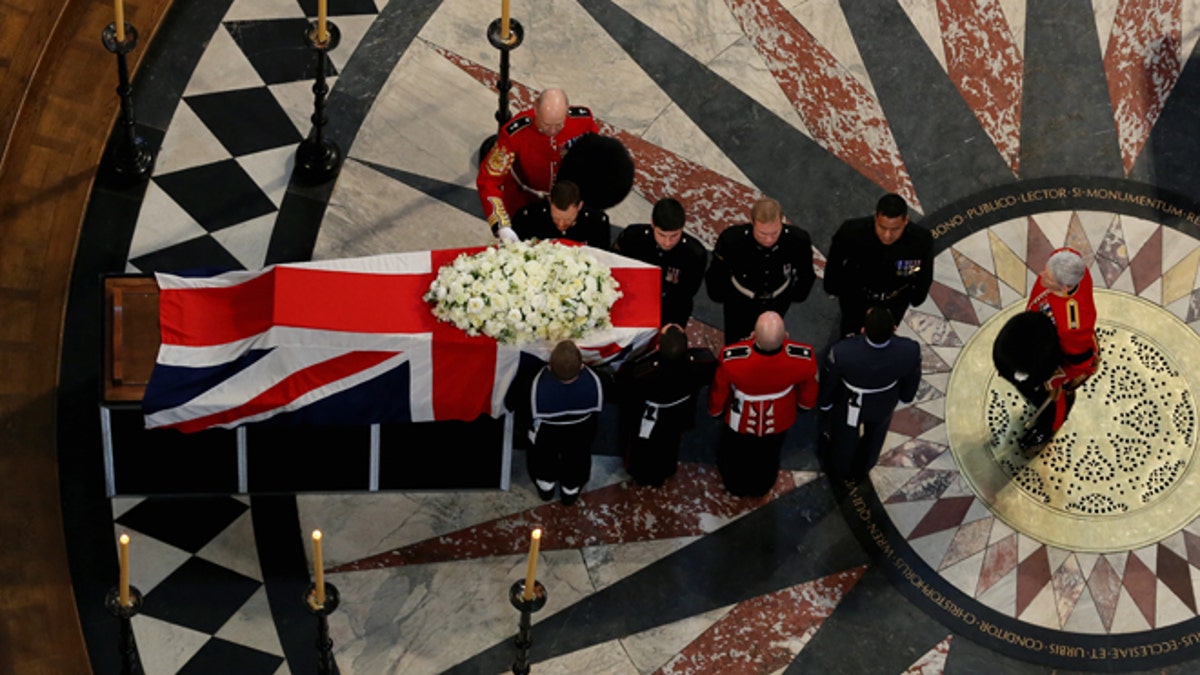
The coffin containing the body of former British Prime Minister Margaret Thatcher leaves the ceremonial funeral at St Paul's Cathedral in London, Wednesday April 17, 2013. World leaders and dignitaries from 170 countries are due to attend the funeral of former British Prime Minister Margaret Thatcher on Wednesday, an elaborate affair with full military honors that will culminate in a service at St. Paul's Cathedral in London. (AP Photo/Gareth Fuller, Pool) (WPA ROTA2013)
London – In a continuation of a decades-old conflict between the Southern Cone nation and Great Britain, the Argentinean ambassador to the United Kingdom snubbed her invite to the funeral of late British Prime Minister Margaret Thatcher.
Argentinean ambassador Alicia Castro was one of a number of high profile dignitaries to turn down an invitation to the funeral that is expected to have more than 2,300 guests packed into London’s St. Paul’s Cathedral. Other notables who turned their invites include former U.S. President Bill Clinton and his wife, former Secretary of State Hillary Clinton, former Soviet leader Mikhail Gorbachev, German Chancellor Angela Merkel and Mexican President Enrique Peña Nieto.
Argentina President Cristina Fernández de Kirchner was not invited to the funeral. Foreign minister Hectór Timmerman was also denied an invite to the funeral.
“What do I care if I’m not invited to a place where I didn’t think of going?” Mr. Timerman added in comments broadcast on Argentine radio on Thursday. “The woman died. Let her family mourn in peace.”
Argentina and the United Kingdom have had tense relations ever since the 1982 Falklands War, which saw Argentinean forces invade the Falkands, South Georgia and South Sandwich Islands. The resulting conflict lasted 74 days and ended with the Argentine surrender on 14 June 1982, along with the deaths of 649 Argentine military personnel, 255 British military personnel and three Falkland Islanders.
- Margaret Thatcher’s Legacy Partly Hinged On Falklands Islands War
- Argentina Accuses HSBC of Evading Taxes & Laundering Money
- Margaret Thatcher’s Death Stirs Mixed Feelings In Argentina
- Argentina Could Defy New York Court Order To Pay Off Debt
- Lady Thatcher, A Woman of Core Values
- Best Pix Of The Week
- Best Sports Pix Of The Week
- Argentina Shows Its Best Moves in Annual Tango Competition
The conflict is generally viewed as one of the reasons for the downfall of the Argentinean military junta and was described by Thatcher shortly before her passing as the "worst moment" of her life.
The two countries reinstated diplomatic relations when Thatcher left office in 1990 and were on generally cordial terms until mid-2010 when reports of oil exploration around the Falkland Islands surfaced.
Since then, British Prime Minister David Cameron and Argentinean President Cristina Fernández de Kirchner have engaged in a heated war of words and relations have once again become strained.
During Thatcher’s funeral, Bishop of London Richard Chartres spoke of the strong feelings the former prime minister still evokes 23 years after leaving office.
"The storm of conflicting opinions centers on the Mrs. Thatcher who became a symbolic figure — even an -ism," he said. "Today the remains of the real Margaret Hilda Thatcher are here at her funeral service."
"There is an important place for debating policies and legacy ... but here and today is neither the time nor the place."
More than 700 soldiers, sailors and air force personnel lined the route taken by Thatcher's coffin to the cathedral and around 4,000 police officers were on duty. Security was stepped up after Monday's bombings at the Boston Marathon that killed three people and wounded more than 170.
Spectators lining the route broke into applause — and scattered boos — as the carriage passed by, escorted by young soldiers, sailors and airmen.
Some clearly disagreed with the bishop's exhortation to leave politics at home. Some staged silent protests by turning their backs on Thatcher's coffin. One man held a banner declaring "Rest in shame." Arguments also broke out in the crowd along the route between Thatcher supporters and opponents.
Guests inside the cathedral included Thatcher's political colleagues and rivals and her successors as prime minister — John Major, Tony Blair, Gordon Brown and David Cameron.
Former U.S. Secretary of State Henry Kissinger and former Vice President Dick Cheney were among the American dignitaries, while figures from Thatcher's era included F.W. de Klerk, the last apartheid-era leader of South Africa; former Polish President Lech Walesa; ex-Canadian Prime Minister Brian Mulroney and entertainers including "Dynasty" star Joan Collins, singer Shirley Bassey and composer Andrew Lloyd Webber.
The ceremony was traditional, dignified and very British. Mourners entered to music by British composers including Edward Elgar and Ralph Vaughan Williams, and the service featured hymns and readings chosen by Thatcher, who grew up as a grocer's daughter in a hard-working Methodist household.
The Associated Press contributed to this report.
Follow us on twitter.com/foxnewslatino
Like us at facebook.com/foxnewslatino
